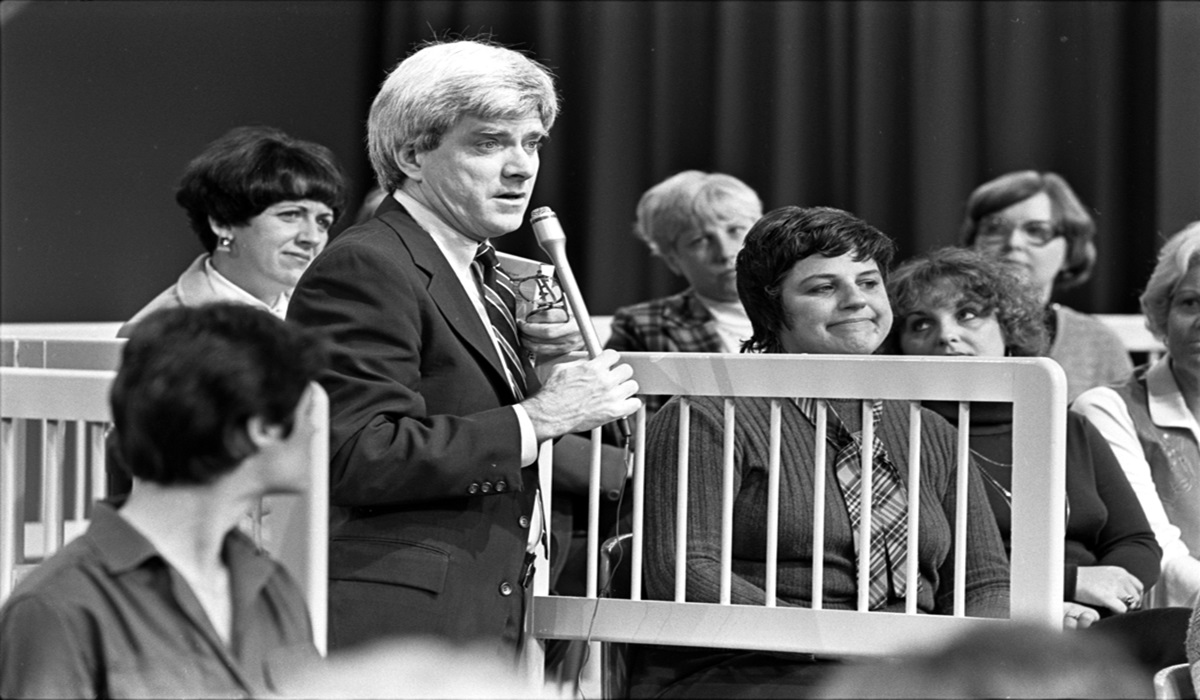Remembering Phil Donahue: The Talk Show Pioneer Who Transformed Daytime TV
- Kingston Bailey
- Entertainment
- Trending
- August 20, 2024

Image Credit, https://digital.library.ucla.edu/catalog/ark:/21198/zz0002r8fm
Phil Donahue, the pioneering talk show host who redefined American television, has passed away at the age of 88. His death marks the end of an era for broadcast journalism and daytime television, where his influence remains indelible.
Born on December 21, 1935, in Cleveland, Ohio, Donahue grew up in a working-class Irish Catholic family. He graduated from the University of Notre Dame in 1957 and began his career in local radio and television before eventually breaking into the national spotlight. In 1967, “The Phil Donahue Show” premiered, introducing a new format that would forever change the landscape of daytime television. Unlike traditional shows that focused on entertainment and light topics, he tackled controversial social issues head-on, offering a platform for debate and discussion at a time when such topics were rarely addressed on television.
The show was revolutionary not just for its content but also for its format. Donahue brought the audience into the conversation, walking among them with a microphone, inviting their questions and comments in real-time. This interactive style set “The Phil Donahue Show” apart from anything else on television and paved the way for future talk shows that sought to engage directly with their viewers.
Over its 29-year run, the show covered a wide range of issues, from civil rights and feminism to LGBTQ+ rights and politics. Donahue was known for giving a voice to those who were often marginalized or overlooked by mainstream media. He was unafraid to challenge the status quo and was often at the center of heated debates. His willingness to explore difficult and controversial subjects made him a beloved figure to many, but it also attracted criticism from those who felt he was too liberal or provocative.
His impact extended beyond the confines of his own show. He inspired a generation of talk show hosts, including Oprah Winfrey, who has often credited him as a major influence on her own career. His approach to television—combining journalism with entertainment, and advocacy with conversation—became the blueprint for many shows that followed.
In addition to his work on television, Donahue was a passionate advocate for peace and social justice. He was outspoken in his opposition to the Iraq War and, in 2002, hosted a short-lived program on MSNBC that was canceled, allegedly due to his anti-war stance. His commitment to his principles, even in the face of opposition, further solidified his reputation as a fearless and principled broadcaster.
His passing is a moment of reflection for the television industry and for those who grew up watching his show. His contributions to media, his dedication to giving a voice to the voiceless, and his fearless approach to discussing difficult issues have left a lasting legacy. In a media landscape that is increasingly polarized, his ability to bring people together in conversation—often difficult, sometimes uncomfortable, but always respectful—remains a model for what television can and should be.
Phil Donahue is survived by his wife, actress Marlo Thomas, and their five children. As the world mourns his loss, it also celebrates the life of a man who changed the face of television and, in doing so, changed the way we talk to each other. His legacy is one of courage, curiosity, and an unwavering commitment to the truth.








